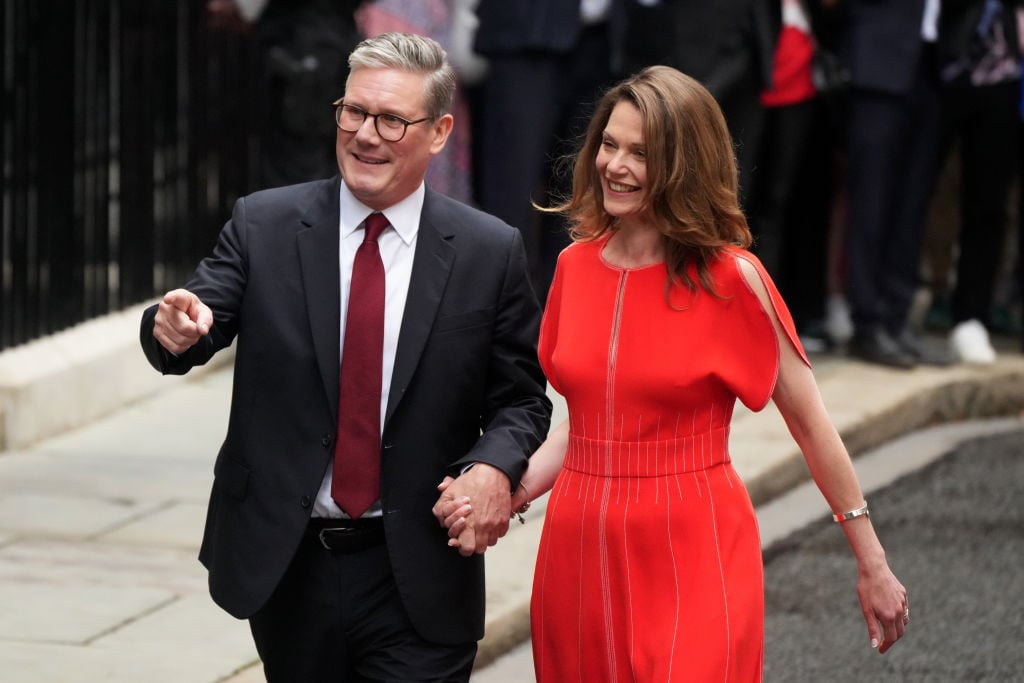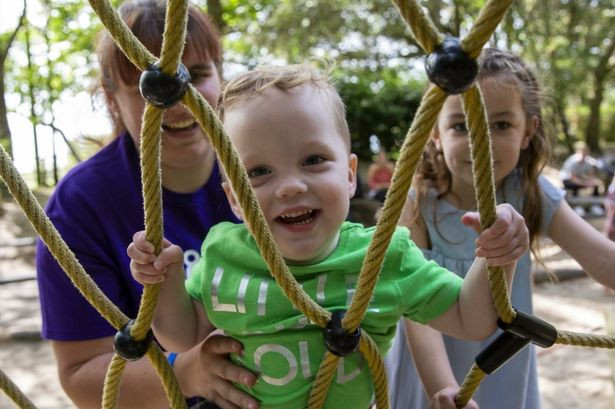This should be a time of celebration for Britain’s Labour Party, which opened its annual conference Sunday less than three months after winning power in a landslide after 14 years in opposition. But it’s no victory lap for Prime Minister Keir Starmer. His government is facing a reckoning with a battered economy and an electorate impatient for change. The mood among Labour members gathering in the northwest England city of Liverpool has been further dampened by a tempest over Starmer’s acceptance of freebies at a time when the millions of people are struggling with the cost of living. Starmer insists he followed the rules when he took clothes and designer eyeglasses from Waheed Alli, a media entrepreneur and longtime Labour donor. But after days of negative headlines, the party now says Starmer won’t accept any more free outfits.
“I get that people are angry,” said Deputy Prime Minister Angela Rayner, who also accepted donations to pay for clothing. “But donations for gifts and hospitality and monetary donations have been a feature of our politics for a very long time,” she told the BBC. “People can look it up and see what people have had donations for, and the transparency is really important.”
Starmer won the July 4 election on a promise to “restore politics as a force for good” after scandal-tarnished years under the Conservatives. He vowed to get the country’s sluggish economy growing and restore frayed public services such as the state-funded National Health Service. Since then, he has struck a gloomy note, saying there is a 22 billion pound ($29 billion) “black hole” in the public finances left by the Conservative government, and warning that “things will get worse” before they get better. One of the government’s first major acts was to strip millions of retirees of a payment intended to help heat their homes in winter.
Starmer also had to deal with anti-immigrant unrest that erupted after three children were stabbed to death in Southport, near Liverpool in July. Starmer responded firmly, pledging swift justice and tough sentences for rioters. But prison overcrowding, a legacy of the last government, meant hundreds of inmates had to be freed early to make way for the newly convicted rioters. Then came the clothing scandal, dubbed “frockgate” after dresses gifted to the prime minister’s wife, Victoria Starmer.
Keir Starmer is also facing grumbling among his own employees over the salary of his chief of staff, Sue Gray. The BBC disclosed that she is paid 170,000 pounds ($225,000) a year — about 3,000 pounds more than the prime minister’s salary. The government says it wasn’t involved in setting the pay scale for political advisers.
Labour says that the criticism is being whipped up by the Conservatives and their media supporters. But polls suggest it has hurt. An Ipsos poll released Friday found 25% of respondents thought Starmer was doing a good job – down from 36% in July -- while 42% thought he was doing a bad job, up from 14%. The firm interviewed 1,082 adults by telephone and the margin of error is plus or minus three percentage points. “He promised to be different, but he hasn’t been,” Conservative lawmaker Chris Philp told the BBC. “He is not running a government of service, he is running a government of self-service.”
Labour leaders will try to convey a more positive message when Treasury chief Rachel Reeves makes a televised conference speech on Monday, followed by Starmer on Tuesday. They’re hoping to inject some cheer into the four-day conference, a blend of pep rally, policy forum and boozy bash that plays a key role in maintaining morale among party activists.
The government argues that it has already made a string of positive changes, including ending a wave of public-sector strikes. In the coming weeks, it plans legislation to take public ownership of the railways, set up a state-owned green energy firm, impose tougher rules on water firms that dump sewage and strengthen rights for workers and renters.
Victoria Honeyman, professor of British politics at the University of Leeds, said Labour’s first months in office were destined to be difficult because voters’ expectations were so high. “But they have made mistakes,” she said. “The business with the clothing, it’s not a terminal blow, but it’s the kind of thing that will stick in people’s minds for a certain amount of time and could so easily have been avoided. It smacks of a lack of attention or a lack of caution, neither of which are good looks.”
Whatever the Starmer administration’s woes, Labour’s first conference as the party of government in 15 long years will still have an element of gleeful excitement. But nagging doubts will not be hard to find, and they will go further than the awful mess over gifts and donations. A panicked prime minister is now vowing to protect public services from austerity while sticking to his lines about the forthcoming budget being “tough”, and replete with “difficult decisions”, which means that the big question simmering away in Liverpool’s hotels and bars remains unavoidable. The conference’s key slogan is “Change begins”. But if the government’s aims and targets are constrained by thrift, what will that actually look like?
One policy area brings all that into sharp focus: housing, which will surely be one of the things most animatedly debated on the conference fringe. Labour, we know, says it will oversee the building of 1.5m new homes by the time of the next election, or 300,000 a year. For the most part, ministers have portrayed this in terms of houses people will buy, built by developers that will supposedly jump into action once planning rules are loosened. But there is another Labour promise that often looks even more uncertain: the pledge to “deliver the biggest boost to social and affordable housing in a generation”.
The crisis that such talk vaguely answers is only getting worse. Last week, the housing charity Shelter published new research showing that one in 78 children in England – 152,000, in total – are homeless, and living in temporary accommodation. At the last count, households on English councils’ housing waiting lists had reached 1.29m, the highest number in 10 years. In 2022-23, 9,561 new social homes were completed in England, which is a truly miserable number. For the housing associations that now dominate the social sector and the local authorities that provide council housing, rental income is 15% lower in real terms than 10 years ago – a decline partly caused by rent caps – while outgoings are spiralling, thanks to the rising cost of basic housing materials, and the necessity of meeting new environmental and building standards. Meanwhile, the survival of Margaret Thatcher’s right-to-buy policy constantly eats away at councils’ housing stocks, as well as the rationale for putting up new homes: why build them if they are probably just to be rapidly sold off?
In ways that are still underappreciated, the human cost of this mess is reflected in our politics. Whenever I talk to people who are bitterly disconnected from the mainstream, and often in the market for the simplicities offered by populism, many conversations soon alight on sons, daughters and grandchildren with no hope of finding somewhere dependable to live, and the general sense that any new housing they see offers no solutions. There is an experience I have had all over the country, next to flash new developments surrounded by those hoardings that always feature happy people drinking cappuccinos, and such slogans as “Live, work, dream”. The people I meet close by usually say much the same thing: “Who’s that for? Not me.”
Housing is the core of the ministerial brief overseen by the deputy prime minister, Angela Rayner. In her conference speech on Sunday, she re-emphasised new protections for renters, and the promise to make all housing “decent, safe and warm”. Her department is also mulling over changes to right to buy that would limit the buyer discounts that make councils’ finances even more fragile, and there is also welcome talk of removing the policy from newly built houses and flats. In the budget, Rachel Reeves is expected to announce a plan to increase social rents whereby they will rise each year by inflation plus 1%, putting councils and housing associations on a more secure footing. But this move threatens an increased financial burden on people who are often already living in precarious circumstances: what would happen if the cost of living rose sharply again, as it did only two years ago? It also highlights the limits of what has so far been announced: at best, these measures will cause a modest uptick in social housing, when what we need is a thoroughgoing revival.
Before her speech, Rayner was interviewed by the BBC’s Laura Kuenssberg. Around half of their exchanges were about the gifts row, and her own experiences of the Labour peer Lord Alli’s seemingly endless generosity. But she was also asked about social and council housing, repeating the “biggest boost in a generation” line, but refusing to harden it up with even a rough number to aim at. “It’s really difficult to put an exact target on that,” she said, claiming that the systems she has to navigate have “so many moving parts”. From the conference platform, Rayner claimed that the government will “build more social homes than we lose within the first financial year of this Labour government”. In 2022-23, England lost 24,000 such properties thanks to sales, and another 3,000 were demolished: to put those numbers in perspective, Shelter says that at least 90,000 new social homes now need to be built every year. This latest pledge is welcome; it also barely touches the scale of the problems the government faces.
In that sense, they are dancing around an inescapable fact. If Starmer, Rayner and their colleagues are going to get even close to their housing targets, properly funded social housing will have to be at the heart of everything. The history of the past 40 or 50 years, moreover, shows that fixating on housing associations has been part of the problem. Even though many are imaginative and ambitious, they are too small-scale and fragmented to be put in charge of any serious policy shift: instead, the most obvious move is to go back to the future.
The last time that 300,000 new homes were built each year was in the late 1960s. Back then, councils were responsible for half of all housing supply. Plenty of people in city and local government would gladly resume that role, but there are huge obstacles in the way. Twenty English councils recently called for a one-off injection of £644m to make up for lost revenue, and pointed to a black hole – yes, another one – in councils’ housing budgets that is set to reach £2.2bn by 2028. Talk to housing campaigners – many will be at a fringe meeting organised by the Labour Campaign for Council Housing, on Monday – and they often insist that such emergency assistance to fill those gaps should only be the start: any housing renaissance will inevitably need long-term financial backing from Westminster and Whitehall.
This is exactly the kind of stark truth that will be haunting Liverpool this week, as MPs, councillors and activists savour a success that is already souring in all that talk about tough decisions and limited options, not to mention senior figures’ apparent fondness for living the high life at others’ expense. Most Labour people surely know something obvious: that the last slivers of joy at their party’s sudden political dominance will not last long or mean much if our social crises go unanswered – and, for thousands of people, one of the most basic human needs remains unmet.
John Harris is a Guardian columnist
















